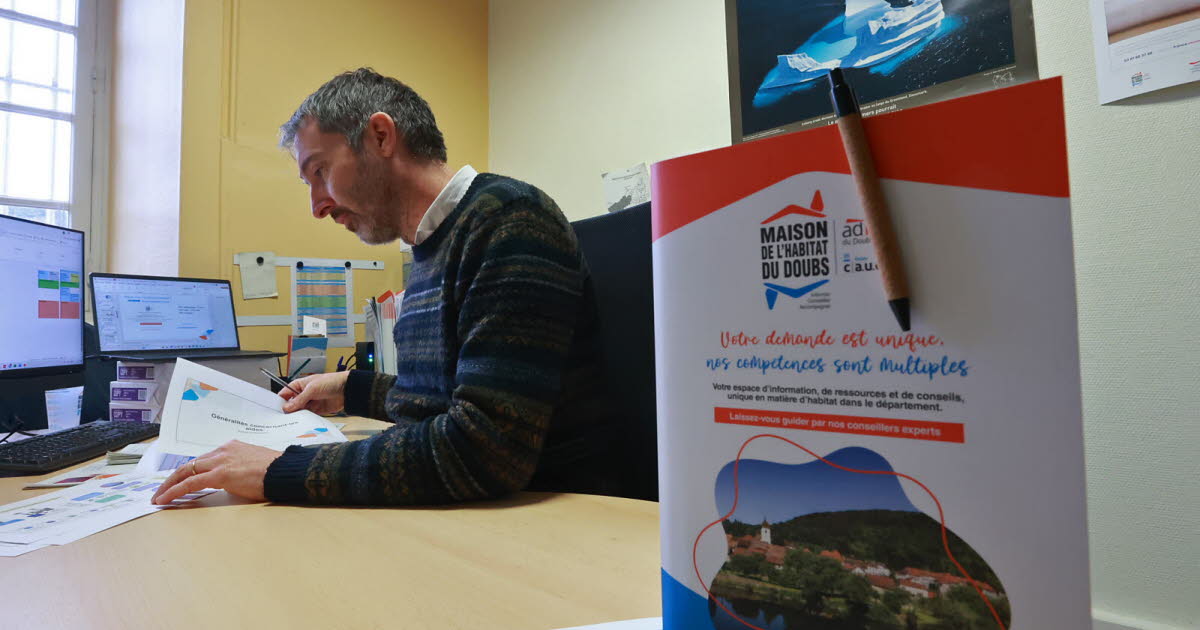Energy renewal stalled in 2023 in the department (read elsewhere), especially with regard to the peak of 2022. Visibly back on track in 2024: since the beginning of the month, Maison de l Habitat du Doubs advisers are indeed in high demand. “Now it takes 10 days for a phone appointment,” summarizes Erik Dorge, one of the experts for this service, which is quite rare in France because it brings together lawyers, France Rénova experts and architects within the same entity – one, public and free entry point for all issues related to housing.
Aid amounts “doubled, even quadrupled”
This increase in demand is of course linked to the new features of MaPrimeRénov from 2024, this aid system established by the state in 2020 (and managed by ANAH, the National Housing Agency). Many owners who wanted to carry out energy renovation work were waiting to find out more about the (new) changes being decided in the framework of the finance law.
In fact, it is not easy to navigate through different aids and access conditions. Better to turn to experts. Especially since the scams that flourished under the “€1 insulation” type program have undoubtedly made many owners wary.
The first change for integration, according to Erik Dorge: it is now mandatory to carry out a DPE (Diagnosis of Energy Efficiency) to apply for renovation assistance. The second big change: a clear distinction between large-scale renewal and “one gesture” renewal.
“It’s a revolution”
The second is always subsidized. But for this it must be connected to a carbon-free heating or hot water production system – and it is aimed only at energy classes from A to E. The tightening, which, combined with the DPE obligation, has not gone unnoticed by craftsmen (read elsewhere).
Namely, the state is clearly in favor of the second option: “ambitious” renovation, the one that allows skipping at least two energy classes (switching from E to C, for example).
The idea is of course to encourage the owners to undertake more important and “efficient” work. Hence the significantly expanded financial support: “The right to help can be exercised by all categories of resources”, emphasizes Erik Dorge. And the latter are “interesting” to everyone: “they doubled, tripled, even quadrupled”.
The increase in the amount and target audience prompted Pascal Valladont, director of specialist housing operator Soliha, to say that what will happen “in the next six months is going to be gigantic”. “It’s a revolution,” he assures. “For very modest owners,” he emphasizes, “the subsidy rate can reach 90% for 70,000 euros of work.” A significant contribution, provided of course you can finance the rest.
“Eco-credit without interest”
In any case, the system seems to be to their liking: “People who call to find out about one type of job usually leave with the idea of doing three jobs,” sums up Erik Dorge. The adviser mentions the case of a middle-income man who wanted to carry out the renovation little by little, but who, considering the help, is considering starting a global operation. “He would go from E to B, three jumps in grade. Amount of acceptable work: €55,000. Amount of assistance: €27,500. And this is someone who last year had a maximum of 10,000 euros in aid. In addition, there is an eco-loan with a zero rate that can go up to 50,000 euros and can be spread over 3 to 20 years.
Approved guides
Meanwhile, the major renovation included in the “supported route” implies at least one obligation: the use of an approved guide called My Rénov’ guide: paid support of course – which is financed 100% for very modest households, 80% for modest households, 40% for medium incomes* and 20% for higher incomes.
Is there enough in Doubs? Undoubtedly, we need more, admits Benoit Fabbri, director of the Department of Territories (DDT). Erik Dorge believes that their current number is sufficient. It also invites owners to choose the listed local operators. “When we see that aid amounts can reach 63,000 euros, we are not safe from fraud. That’s why we do information.” Information available at the Maison de l’Habitat in Besançon (and on its website) as well as the France Rénov’assured telephone lines in the communes. A final word of advice: be wary of all telemarketers.

